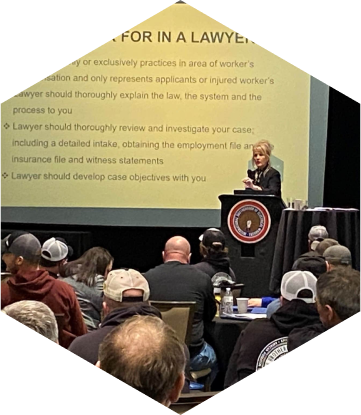Know Your Rights If You Are Injured On The Job
If you are injured at work – from a workplace accident or from the cumulative effects of your job – you are entitled to certain worker’s compensation benefits. Unfortunately, employers and their insurers may try to deny your claim, reduce your benefits or terminate your benefits before you are fully recovered.
My law practice, the Law Office of Lisa A. Wiebusch LLC, is devoted exclusively to Wisconsin worker’s compensation. I have been fighting for injured workers for 30 years. As a solo attorney, I personally handle your case. Put my experience to work for you if your claim has been denied, or you feel you are not being treated fairly.
If It’s Work-Related, It’s Covered By Worker’s Comp
Claims fall into two main categories:
Workplace injuries and accidents
A specific incident such as a fall, head injury, laceration, serious burn, electric shock, explosion or motor vehicle collision
Occupational disease claims
Injuries that develop over time, such as repetitive stress injuries to the spine or joints, or health effects from exposure to toxic chemicals or excessive noise
Worker’s comp is a no-fault system. You are covered even if your own carelessness or clumsiness contributed to your injury, as long as you were engaged in work activities. It does not matter if you had a prior work injury or preexisting medical condition; under Wisconsin law, the employer takes you “as you are.”
What Are The Benefits Under Worker’s Compensation?
The main categories are temporary disability and permanent disability. The employer is responsible for paying all medical expenses associated with the injury, including rehab. Medical coverage can continue after you return to work.
Depending on the severity of your injuries, you may qualify for:
Temporary disability (TPD/TTD)
This refers to replacement wages paid by the worker’s compensation carrier while you are off of work and suffering a wage loss. The payments are equal to two-thirds of your average weekly wage and continue until you are cleared to work.
Permanent partial disability (PPD)
This refers to the loss or partial loss of a part of your body or function of the body part (herniated discs, broken limbs or extremities, loss of a finger or hand, impaired vision, permanent nerve damage, etc.). Worker’s comp pays a fixed benefit based on the specific body part and the degree of disability. You can collect PPD even if you are able to return to work.
Permanent total disability (PTD)
This means your injury is so serious that you cannot sustain any gainful employment. PTD benefits are paid for life, based on your average weekly wage at the time of injury. Examples include catastrophic brain or head injuries, serious spinal injuries, loss of both legs, both arms or both eyes.
Vocational rehabilitation
If you are not totally disabled, but your injuries prevent you from returning to your previous job, you may qualify for retraining for a different line of work. Retraining benefits include but are not limited to: tuition, meals, mileage and wage replacement or TTD while attending school.
Death benefits
If a worker dies from job-related causes, the surviving spouse and dependent children are entitled to benefits plus burial expenses.
Worker’s Compensation Is All I Do
I can protect your rights and hold the employer and insurance company accountable for the benefits you need and deserve. I provide a free initial consultation, and there are no upfront costs to hiring me. I don’t get paid unless you get your benefits.
Areas of Practice

Attorney Lisa Wiebusch presenting at the IBEW Stewards Conference May of 2022

Call my Wausau law office at 715-298-2244 or email me. I represent injured workers in any occupation and statewide.

